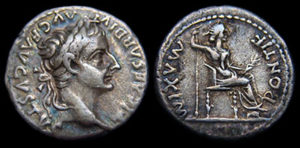And they sent to him some of the Pharisees and some of the Herodians, to trap him in his talk. And they came and said to him, “Teacher, we know that you are true and do not care about anyone’s opinion. For you are not swayed by appearances, but truly teach the way of God. Is it lawful to pay taxes to Caesar, or not? Should we pay them, or should we not?” But, knowing their hypocrisy, he said to them, “Why put me to the test? Bring me a denarius and let me look at it.” And they brought one. And he said to them, “Whose likeness and inscription is this?” They said to him, “Caesar’s.” Jesus said to them, “Render to Caesar the things that are Caesar’s, and to God the things that are God’s.” And they marveled at him. –Mark 12:13-17
Everybody knows what this passage is about, don’t they? It gets glibly quoted to prove that the bible says you should pay your taxes. That’s usually the end of the discussion. There is, however, a lot more going on here. When I visited the nation called Israel, I got to see one of these coins that Jesus refers to from the reign of Tiberius Caesar. I could clearly see the engraved head of Tiberius and the Latin words inscribed. On one side it says, “Augustus Tiberius, son of the Divine Augustus” and the other side said (shockingly, at least to me), “High Priest”. They thought that the Emperor was the High Priest of the Roman cult. No matter how one looks at it, Caesar was engraved on that coin as the son of a god.
We haven’t heard about the Herodians since chapter 3 in Mark. The Herodians were thought to be enlightened and progressive, while the Pharisees upheld conservative, traditional values. The Pharisees believed their culture was being lost to pluralism and paganism, and they wanted a return to traditional values. Sound familiar? There aren’t many enemies as bitter as the Herodians and the Pharisees. Still, they are united that they must get rid of Jesus. Back in chapter 3, not only do they cooperate with each other, but the Pharisees take the lead against Jesus. So here they come again trying to trick Jesus into saying the wrong thing.
They are not sneaky at all since their trap is easy to spot: if Jesus supports paying taxes to Rome, the Jewish crowds might turn on Him, but if He denounces the tax, then Pontius Pilate would have grounds to charge Him with inciting revolt. That’s a capital crime. Curiously, Jesus is indeed leading a revolution, but it is one of going the second mile, turning the other cheek, healing, feeding, and acts of mercy. He’s too smart to get caught in this trap though. He’s not going to issue a verdict on the “Should we pay them, or should we not?” debate.
The first thing He does is force them to look at and handle the “dirty money,” which pious Jews would not have done. They could use Jewish coins instead. A graven image of any man was forbidden, but one named as the “High Priest” and “Son of the Divine” is anathema to them! This is how Jesus demonstrates that they are cozier with the profane than they let on. When He says, “Render to Caesar the things that are Caesar’s” He is scornful without being seditious, essentially saying, “Send this filth back where it came from.”
Then He gives a command that speaks to the context of what He did in the temple and with the Parable of the Vineyard. “Render to…God the things that are God’s.” The temple was no longer a place where the blessings were for all the nations (just Israel—mainly Israel’s religious leaders). In the Parable of the Vineyard, the fruit belonging to God was kept by the wicked tenants rather than being distributed as God wanted. Here, Jesus is condemning the leaders for not giving God what is His, particularly in blessings for the nations.
So then, pay your taxes as Jesus says, but that’s not what the passage is about. It is not about maintaining a sharp division between church and state. This passage is about Jesus wanting the blessed fruit of God’s vineyard to be rendered unto the world. What the Pharisees and Herodians don’t get is that Jesus is the fruit, even the vine of the fruit, and those who remain in Him will have more fruit, abundant in measure, for the Kingdom of God into all eternity. And that’s the gospel.
